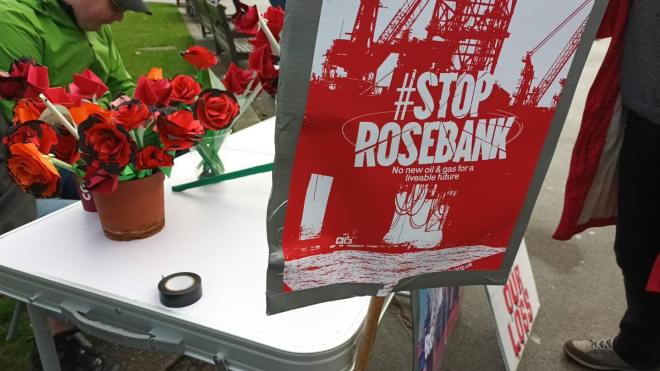“The world is burning and the UK Government is helping the arsonists pay for the fuel”

Climate campaigners have reacted with outrage at the news that Norwegian oil giant Equinor has today announced pre-tax profits of £5.8 billion (US$7.5 billion) in JST THE LAST THREE MONTHS.
Campaigners said that with climate-induced fires sweeping Greece “the UK Government is helping the arsonists pay for the fuel” with a massive tax break for Equinor to develop a new oil field.
Equinor’s flagship project in the UK, the controversial Rosebank oil field, is in line to pocket a tax break of £3.75 billion from the UK Government to incentivise its development. This deliberate loophole in the Windfall Tax means that 91% of the cost of developing the 500 million barrel field will be covered by the public purse, despite Equinor’s massive profits and the fact that 80% of Rosebank’s oil will be exported.

Campaigners in Aberdeen yesterday delivered a giant ‘cheque’ to the Equinor offices to highlight the injustice of the tax break.
Last year, Equinor broke records with pre-tax yearly profits of £62 billion (US$74.9billion), benefiting from increased prices for oil and gas due to the war in Ukraine. Meanwhile, energy bills for consumers skyrocketed and millions were pushed into fuel poverty.
There has been widespread opposition to the Rosebank field, with public protests across the UK, politicians including SNP MPs Tommy Sheppard and Mhairi Black and the head of the UK Government’s own climate advisory committee, Lord Deben, speaking out against the project.
A decision on Rosebank is rumoured to be scheduled for after the summer recess, following delays due to concerns that the project would not meet net zero commitments under the North Sea Transition Deal.
Friends of the Earth Scotland’s oil and gas campaigner Freya Aitchison said: “These outrageous profits every quarter serve as a stark reminder that companies like Equinor have no intention of changing their ways.
“Fossil fuel giants are simply making too much money from upholding the climate-destroying status quo. Adding insult to injury is the massive tax break Equinor will receive should they go ahead with Rosebank, showing how the UK Government would rather hand out public money than say no to big polluters.

“Grant Shapps and the Department for Energy Security and Net Zero are blatantly ignoring the devastating impacts of climate breakdown, exemplified most recently in the terrifying wildfires in Greece.
“By cheerfully inviting oil companies to drill for yet more polluting fossil fuels, they are effectively denying the reality of the climate crisis. The world is burning and the UK Government is helping the arsonists pay for the fuel.
“The Scottish Government can no longer sit on the fence on this climate denial and must speak out against Rosebank and all other new fossil fuel projects. We need a just transition to clean, affordable energy now.”
BREAKING NEWS: British Gas parent company Centrica has just posted it’s highest ever profits – £969 million in first six months of this year. Shell, too, has just posted eye-watering profits.
No cost of living crisis for these companies …




